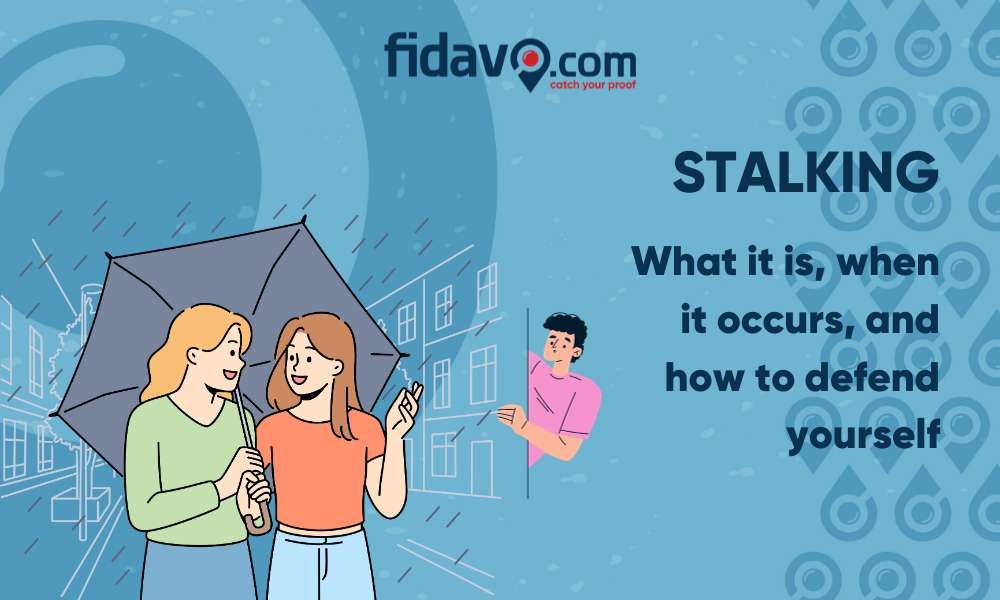Stalking: what it is, when it occurs, and how to defend yourself

What is stalking?
Stalking is a set of intrusive behaviors and repetitive attitudes, at times overwhelming: the victim is watched, followed, and bothered. The stalker is always seeking contact through phone calls, sometimes silent, often aggressive, or by leaving notes or letters at the victim's doorstep. The motivations behind this heterogeneous phenomenon are related to various factors, such as personality disorders, like schizophrenia, delusion, criminality, emotional, romantic, persecutory, angry, or morbid attachment.
When does stalking become a crime?
According to the provisions of Law No. 38/2009, stalking becomes a criminal offense when an individual engages in prolonged acts that cause psychological violence to a victim, instilling fear for their personal safety, causing anxiety, or forcing a change in personal habits, such as abandoning an apartment or changing a phone number.
At times, it involves bothersome and seemingly innocent behaviors, such as the continuous sending of bouquets of flowers, which, however, result in psychological violence towards the victim. Often, those who are victims of stalking reduce social activities, even ending up leaving their job. If the stalker's behaviors prove dangerous, the traumatic event can negatively impact the routine of the stressed individual: headaches, fatigue, eating disorders, difficulty falling asleep, and depersonalization problems are quite common reactions.
What are the most recurring characteristics of a stalker?
The careful analysis of desires that lead to this annoying behavior has allowed the identification of typical characteristics of stalkers.
There are resentful stalkers who respond to perceived offenses with a series of actions that disturb the victim, instilling fear.
The rejected, on the other hand, do not accept the end of a relationship and continuously seek contact with the victim, hoping that everything will return to the way it used to be.
Then there are intimacy-seeking stalkers, who believe they are loved, targeting victims, often acquaintances, who have attracted their affection.
Counter-stalkers are predators in every sense: they react emotionally, hunting the victim.
Examples of stalking
Direct public checks are the most common examples of stalking. Whether it's an inappropriate visit to the workplace, intrusion into an apartment, following someone home, surveillance of a car, or actions where the stalker spies on the victim, it is essential to always pay maximum attention.
There are also behaviors associated with the phenomenon, such as leaving dead animals at home, puncturing car tires, acts of vandalism targeting the home environment or car, threats of physical violence, extortion for goods, the publication of public announcements or listings that include the victim's phone number, repeated legal actions, often without a real foundation.
What to do to defend against a stalker?
Unfortunately, the phenomenon of stalking, constantly on the rise, has been underestimated. To prevent the consequences from worsening, it is important to acknowledge the seriousness of the problem, not considering certain threatening and inappropriate attitudes as normal or justifiable.
Those who are victims of stalking should be clear, as ambiguous behaviors could be misinterpreted by the stalker. Paradoxically, the stalker almost feels justified in repeatedly and obsessively controlling the unfortunate victim.
Furthermore, it is essential to not provide any reference points to those engaging in stalking behaviors: isolated places must be strictly avoided. Regarding movements, one should be as unpredictable as possible, so the stalker has no reference points.
How to prove it?
It is always necessary to gather concrete evidence to better protect oneself: recordings of threatening phone calls, testimonies of home invasions, repeated threats, and suffered attacks are undoubtedly useful to demonstrate the crime of stalking.
To defend against phone harassment, it is a wise decision to use voicemail: this way, the victim can rely on recordings as tangible evidence of the psychological violence endured. Installing a second phone line at home is always useful.
Conclusions
The phenomenon of stalking, unfortunately, is continually growing, with more and more victims being overwhelmed by "predators" or "awkward suitors" eager for sexual contact. Additionally, the boom of new media, such as social platforms, has potentially exposed victims to greater scrutiny.
Feel like a victim of stalking? If you believe you are in danger, feel free to seek our help. Our private investigators, with their years of field experience, will be able to gather tangible evidence of the repeated and threatening behaviors of those stalking and bothering you.
```
 EN
EN  IT
IT 